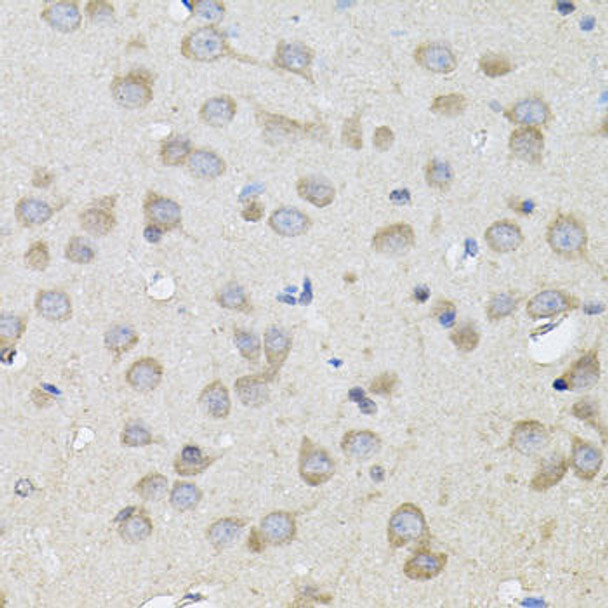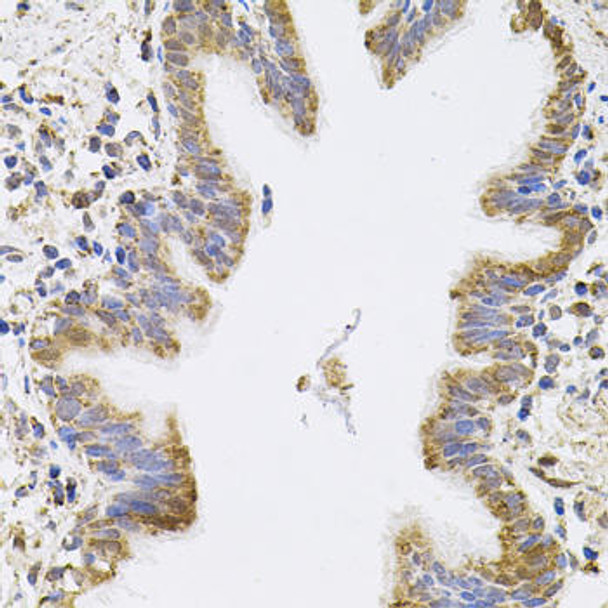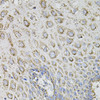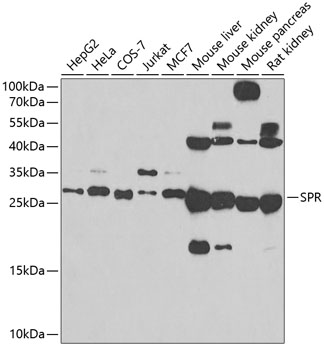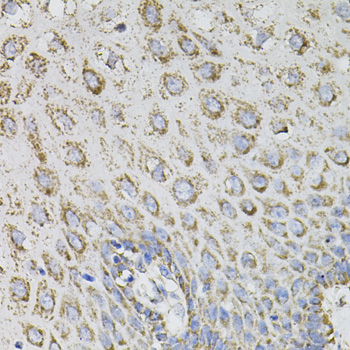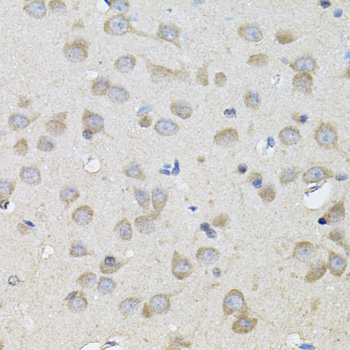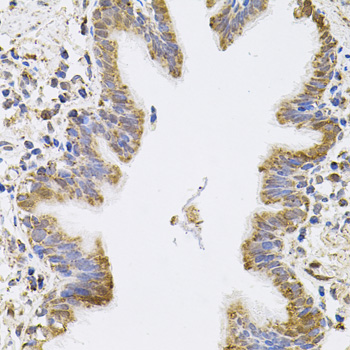Anti-SPR Antibody (CAB7928)
- SKU:
- CAB7928
- Product Type:
- Antibody
- Reactivity:
- Human
- Mouse
- Rat
- Host Species:
- Rabbit
- Isotype:
- IgG
- Antibody Type:
- Polyclonal Antibody
- Research Area:
- Cell Biology
Description
Anti-SPR Antibody (CAB7928)
The SPR Polyclonal Antibody (CAB7928) is a powerful tool for researchers studying the role of SPR (Surface Plasmon Resonance) in various biological processes. SPR is a phenomenon that occurs when light strikes a thin metallic film at a specific angle, resulting in the excitation of surface plasmons. This antibody, generated in rabbits, is highly specific to SPR and is validated for use in immunofluorescence and immunohistochemistry applications.SPR is a versatile technique commonly used in biochemistry and biophysics to study protein-protein interactions, DNA hybridization, and ligand-receptor binding. The SPR Polyclonal Antibody binds specifically to SPR, allowing for accurate detection and analysis of SPR expression in different cell types and tissues.
Its high reactivity with human samples makes it an ideal choice for investigating the role of SPR in disease processes such as cancer, neurodegenerative disorders, and cardiovascular diseases.By using the SPR Polyclonal Antibody in their research, scientists can gain valuable insights into the mechanisms underlying SPR-mediated biological processes and potentially develop new therapeutic strategies targeting SPR for the treatment of various diseases. This antibody is a valuable tool for any research examining the role of SPR in physiology and pathology.
| Antibody Name: | Anti-SPR Antibody |
| Antibody SKU: | CAB7928 |
| Antibody Size: | 20uL, 50uL, 100uL |
| Application: | WB IHC |
| Reactivity: | Human, Mouse, Rat |
| Host Species: | Rabbit |
| Immunogen: | A synthetic peptide of human SPR |
| Application: | WB IHC |
| Recommended Dilution: | WB 1:500 - 1:2000 IHC 1:50 - 1:100 |
| Reactivity: | Human, Mouse, Rat |
| Positive Samples: | HepG2, HeLa, COS-7, Jurkat, MCF7, Mouse liver, Mouse kidney, Mouse pancreas, Rat kidney |
| Immunogen: | A synthetic peptide of human SPR |
| Purification Method: | Affinity purification |
| Storage Buffer: | Store at -20'C. Avoid freeze / thaw cycles. Buffer: PBS with 0.02% sodium azide, 50% glycerol, pH7.3. |
| Isotype: | IgG |
| Sequence: | Email for sequence |
| Gene ID: | 6697 |
| Uniprot: | P35270 |
| Cellular Location: | Cytoplasm |
| Calculated MW: | 28kDa |
| Observed MW: | 28kDa |
| Synonyms: | SPR, SDR38C1 |
| Background: | This gene encodes an aldo-keto reductase that catalyzes the NADPH-dependent reduction of pteridine derivatives and is important in the biosynthesis of tetrahydrobiopterin (BH4). Mutations in this gene result in DOPA-responsive dystonia due to sepiaterin reductase deficiency. A pseudogene has been identified on chromosome 1. |
| UniProt Protein Function: | SPR: Catalyzes the final one or two reductions in tetra- hydrobiopterin biosynthesis to form 5,6,7,8-tetrahydrobiopterin. Defects in SPR are the cause of dystonia DOPA-responsive due to sepiapterin reductase deficiency (DRDSPRD). In the majority of cases, patients manifest progressive psychomotor retardation, dystonia and spasticity. Cognitive anomalies are also often present. The disease is due to severe dopamine and serotonin deficiencies in the central nervous system caused by a defect in BH4 synthesis. Dystonia is defined by the presence of sustained involuntary muscle contractions, often leading to abnormal postures. Belongs to the sepiapterin reductase family. |
| UniProt Protein Details: | Protein type:Cofactor and Vitamin Metabolism - folate biosynthesis; EC 1.1.1.153; Oxidoreductase Chromosomal Location of Human Ortholog: 2p13.2 Cellular Component: cytosol; nucleoplasm Molecular Function:aldo-keto reductase activity; NADP binding; sepiapterin reductase activity Biological Process: nitric oxide biosynthetic process; regulation of nitric-oxide synthase activity; tetrahydrobiopterin biosynthetic process Disease: Dystonia, Dopa-responsive, Due To Sepiapterin Reductase Deficiency |
| NCBI Summary: | This gene encodes an aldo-keto reductase that catalyzes the NADPH-dependent reduction of pteridine derivatives and is important in the biosynthesis of tetrahydrobiopterin (BH4). Mutations in this gene result in DOPA-responsive dystonia due to sepiaterin reductase deficiency. A pseudogene has been identified on chromosome 1. [provided by RefSeq, Jul 2008] |
| UniProt Code: | P35270 |
| NCBI GenInfo Identifier: | 464801 |
| NCBI Gene ID: | 6697 |
| NCBI Accession: | P35270.1 |
| UniProt Secondary Accession: | P35270,Q53GI9, Q9UBB1, A8K741, D6W5H2, |
| UniProt Related Accession: | P35270 |
| Molecular Weight: | 28kDa |
| NCBI Full Name: | Sepiapterin reductase |
| NCBI Synonym Full Names: | sepiapterin reductase (7,8-dihydrobiopterin:NADP+ oxidoreductase) |
| NCBI Official Symbol: | SPR |
| NCBI Official Synonym Symbols: | SDR38C1 |
| NCBI Protein Information: | sepiapterin reductase |
| UniProt Protein Name: | Sepiapterin reductase |
| Protein Family: | Sproutin |
| UniProt Gene Name: | SPR |



